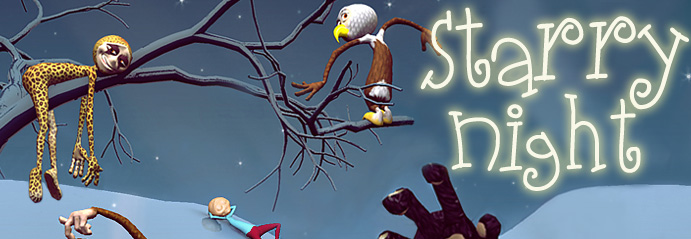
|
|
|
|
|
|
 |
|
|
|
 |
|
|
|
|
|
|
|
Animation Mentor: How did you come up with the concept for your short film?
Issam Zejly:
His story made me realize that there are kids all over the world who will never have the chance to walk, run and jump...and eventually tell such stories. At a tender age, these kids were already in wheelchairs and all they had left were dreams. At that time, I needed to make something that mattered to me – something with more depth than a gag. My grandfather passed away last September, but all the stories he told me will undoubtedly inspire me in my animation.
Animation Mentor: What important lessons did you learn from making your short film? Issam Zejly: One major lesson I learned in the process is that a short film is primarily about story. In my opinion, the story needs to make sense, more so than being well animated. I kept looking for ways to impact people. Another lesson that I learned from this process is that properly testing rigs is crucial. In my case, it almost proved "fatal" (see answer below)! It is essential to take the time to test your rig(s) before embarking on a short movie. Think about all the steps you need to take in order to complete your film, and if needed, have friends help you with the non-animation parts. This could get many of the frustrations out of the way. I personally got two of my friends (thanks Hai & Donald Phan!) to do the UV layouts for me as I was literally pulling my hair out trying to do it! Animation Mentor: How long did it take to complete your film? Issam Zejly:
Issam Zejly: It goes without saying that planning makes any process easier. The more you plan, the more confident you are down the road. Doubt does eventually kick in every now and then, but the more prepared you are, the better armed you will be! Animation Mentor: Do you mind sharing some of the pre-production work with us with a little explanation of what we're looking at. Issam Zejly: As you may notice in my animatic, my drawing skills are those of a 3-year-old. :) But that can't and won't stop me from translating my ideas onto the screen. I actually relied a lot more on video reference (my wife played a big role in that!) making sure I pushed the poses to fit the fantasy world I had in mind.
Rough Pass By going back and forth, I realized that I was instinctively working on animation in an almost sculptural way.
Polish Pass Animation Mentor: What obstacles, if any, did you experience during the creation of your short film? How did you work your way around them? Issam Zejly:
The first thing that came to mind was to scour the internet for any (Maya) scripts that could help me transfer the animation to a working rig. That eventually proved useless as the rig I used was totally different. After a few (depressing) days, I decided to get back to the short movie but this time using Bishop (an Animation Mentor rig). The story was dear to me and I couldn't just let it go because of technicalities. Considering the overwhelming feedback I have been getting from people, I think I made the right decision. :) Animation Mentor: Tell how your Animation Mentor experience helped you in creating your short film. Issam Zejly: |
|